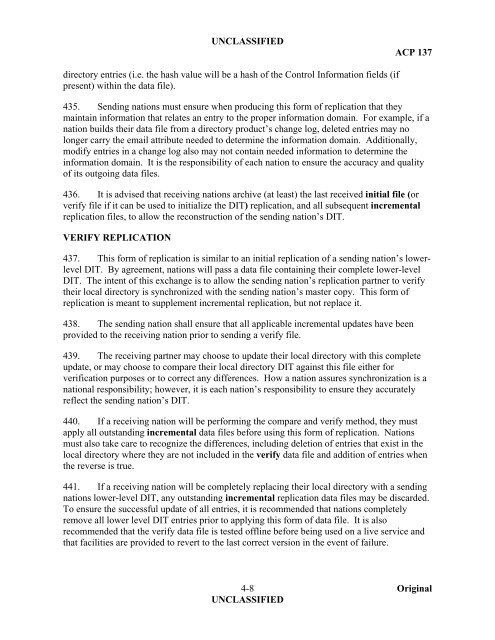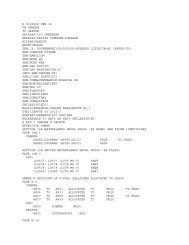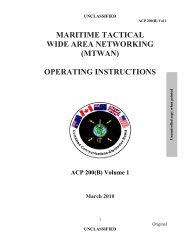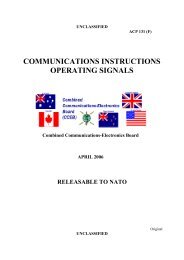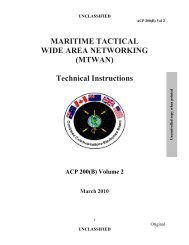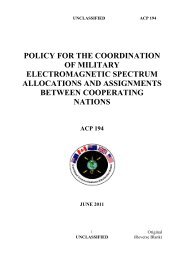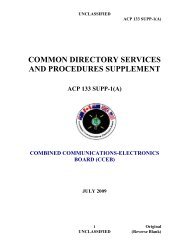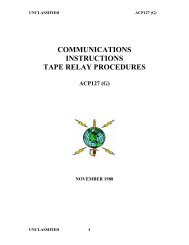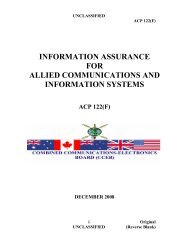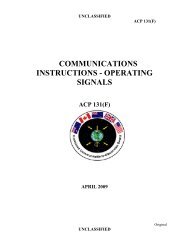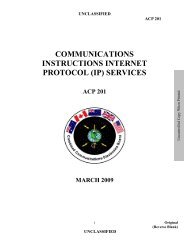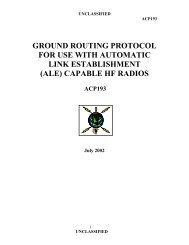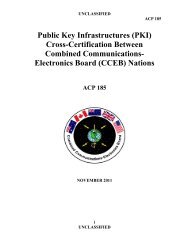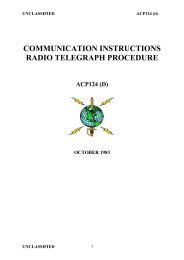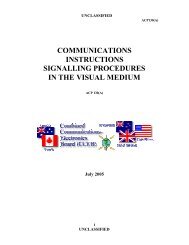ACP 137
ACP 137
ACP 137
Create successful ePaper yourself
Turn your PDF publications into a flip-book with our unique Google optimized e-Paper software.
UNCLASSIFIED<br />
<strong>ACP</strong> <strong>137</strong><br />
directory entries (i.e. the hash value will be a hash of the Control Information fields (if<br />
present) within the data file).<br />
435. Sending nations must ensure when producing this form of replication that they<br />
maintain information that relates an entry to the proper information domain. For example, if a<br />
nation builds their data file from a directory product’s change log, deleted entries may no<br />
longer carry the email attribute needed to determine the information domain. Additionally,<br />
modify entries in a change log also may not contain needed information to determine the<br />
information domain. It is the responsibility of each nation to ensure the accuracy and quality<br />
of its outgoing data files.<br />
436. It is advised that receiving nations archive (at least) the last received initial file (or<br />
verify file if it can be used to initialize the DIT) replication, and all subsequent incremental<br />
replication files, to allow the reconstruction of the sending nation’s DIT.<br />
VERIFY REPLICATION<br />
437. This form of replication is similar to an initial replication of a sending nation’s lowerlevel<br />
DIT. By agreement, nations will pass a data file containing their complete lower-level<br />
DIT. The intent of this exchange is to allow the sending nation’s replication partner to verify<br />
their local directory is synchronized with the sending nation’s master copy. This form of<br />
replication is meant to supplement incremental replication, but not replace it.<br />
438. The sending nation shall ensure that all applicable incremental updates have been<br />
provided to the receiving nation prior to sending a verify file.<br />
439. The receiving partner may choose to update their local directory with this complete<br />
update, or may choose to compare their local directory DIT against this file either for<br />
verification purposes or to correct any differences. How a nation assures synchronization is a<br />
national responsibility; however, it is each nation’s responsibility to ensure they accurately<br />
reflect the sending nation’s DIT.<br />
440. If a receiving nation will be performing the compare and verify method, they must<br />
apply all outstanding incremental data files before using this form of replication. Nations<br />
must also take care to recognize the differences, including deletion of entries that exist in the<br />
local directory where they are not included in the verify data file and addition of entries when<br />
the reverse is true.<br />
441. If a receiving nation will be completely replacing their local directory with a sending<br />
nations lower-level DIT, any outstanding incremental replication data files may be discarded.<br />
To ensure the successful update of all entries, it is recommended that nations completely<br />
remove all lower level DIT entries prior to applying this form of data file. It is also<br />
recommended that the verify data file is tested offline before being used on a live service and<br />
that facilities are provided to revert to the last correct version in the event of failure.<br />
4-8<br />
UNCLASSIFIED<br />
Original


